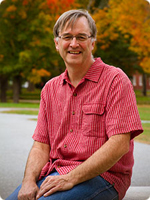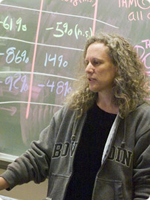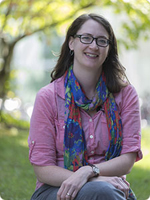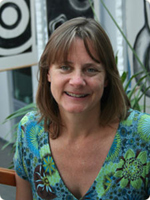Faculty Research

David Carlon, Professor of Biology
David Carlon came to Bowdoin from the University of Hawai‘i at Manoa in the fall of 2014. Carlon is a marine evolutionary biologist and ecologist with degrees from Boston University and UMass Boston and a PhD from the University of New Hampshire. Dave has a broad background in marine research, extensive experience working in marine labs all over the world, and an expansive vision that is invaluable to the enhancement of scope and depth of Bowdoin’s marine lab. Building on his interest in how ocean ecosystems respond to shifting environmental forces, Carlon plans to develop a research emphasis on climate change. His research background includes work in speciation and conservation genetics. In keeping with this big-picture mentality, Carlon will help broaden the lab’s focus to embrace not just biology but other sciences such as oceanography, physics, chemistry, and neuroscience.

Amy Johnson, James R. and Helen Lee Billingsley Professor of Marine Biology
The primary focus of research for Amy Johnson is biomechanics, functional morphology and ecophysiology of marine invertebrates and algae. She has been conducting long-term research on sea urchin growth at the College’s Coastal Studies Center. Research in this field includes mechanisms and modeling of growth of sea urchins, and scaling of metabolic rates. Johnson holds a BA in biology from University of California-Los Angeles, and a PhD in zoology from the University of California-Berkeley.

Michèle LaVigne, Assistant Professor of Earth and Oceanographic Science
Michèle LaVigne is an assistant professor of Earth and Oceanographic Science. A marine biogeochemist and paleoceanographer with an interest in rapid climate change,

Collin Roesler, Professor of Earth and Oceanographic Science
Collin Roesler, a leading expert on optical oceanography, joined the Bowdoin faculty as associate professor of earth and oceanographic science, with tenure, beginning July 1, 2009. Collin is the first oceanographer to have joined the faculty, and has connected Bowdoin's multidisciplinary research and curricula on coastal estuaries, watersheds, and the marine environment. Her fifteen years of teaching and research have included positions at University of Washington; University of Connecticut; Bigelow Laboratory for Ocean Sciences; and University of Maine, Darling Marine Center.
Collin’s work focuses on understanding the response of ocean ecosystems to environmental forcing, including those associated with climate change. Her specialization is in the bio-optical detection and modeling of phytoplankton biomass, production, ecophysiology, and functional groups, particularly with respect to harmful algal blooms, using in situ and remotely sensed optical observations that yield information on highly resolved temporal and/or spatial scales.